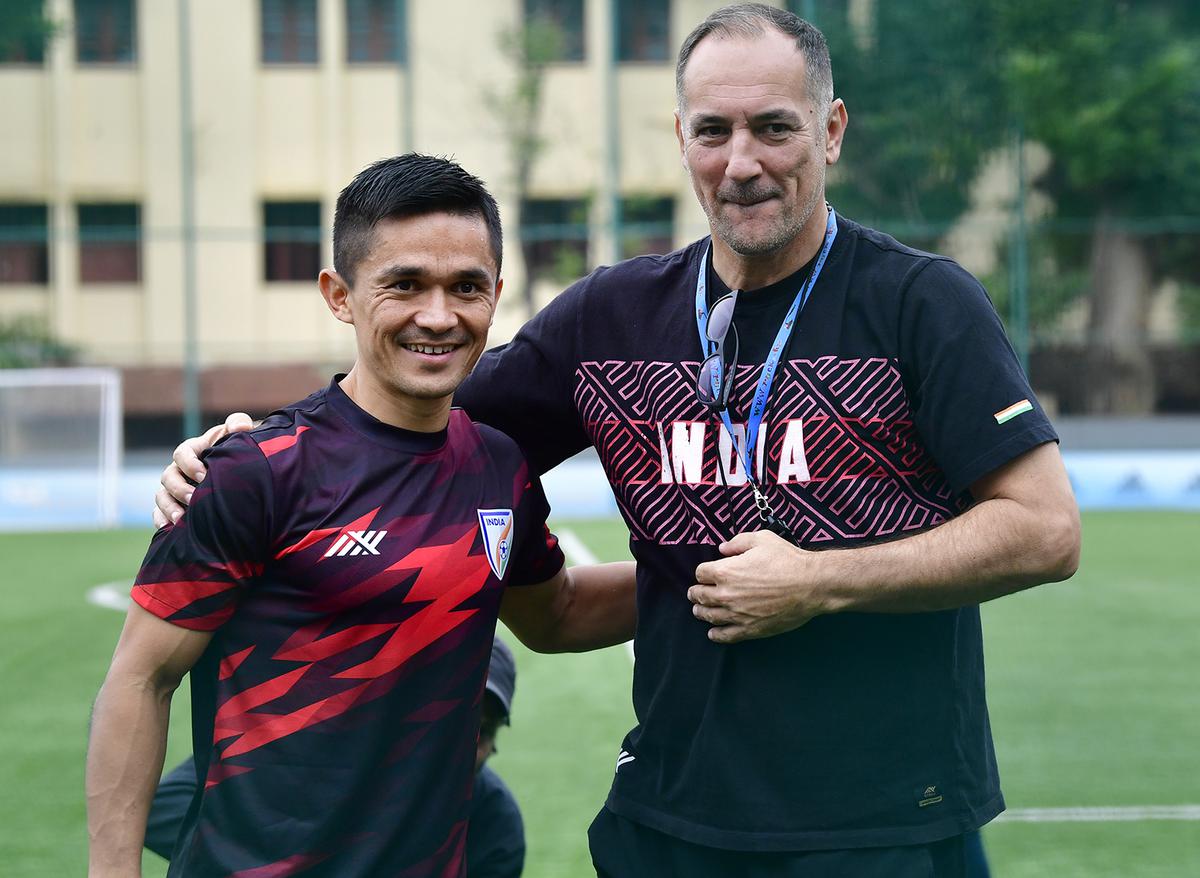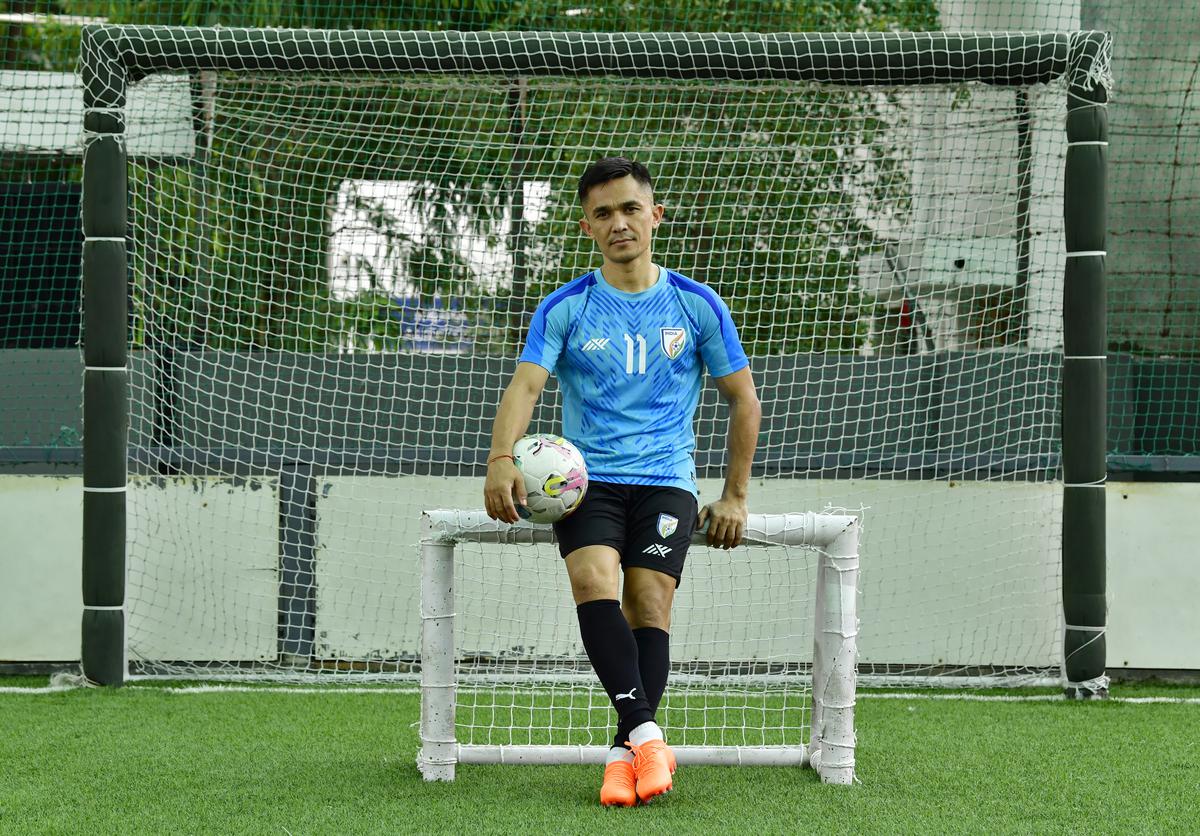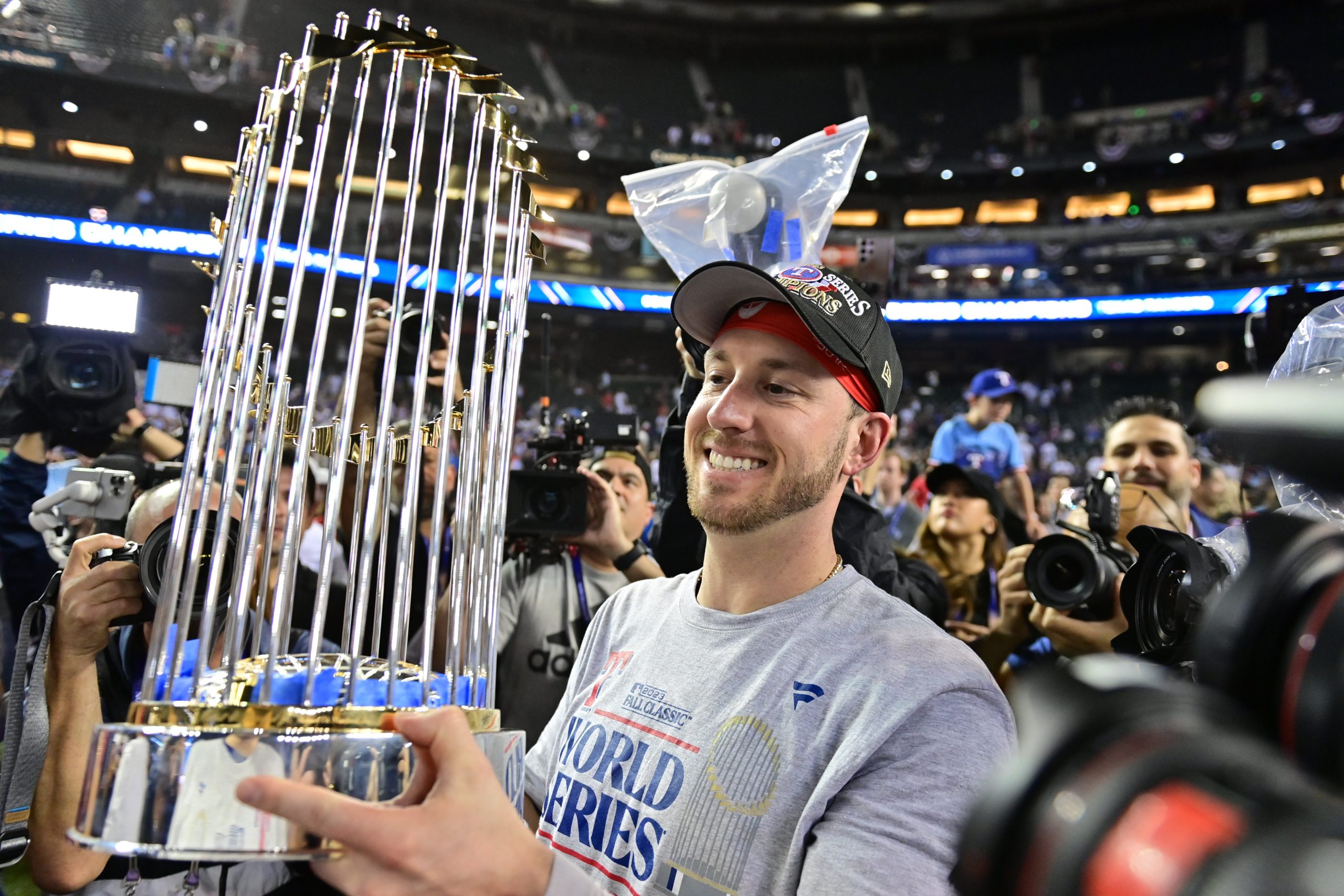When it comes to Indian football, Sunil Chhetri’s name towers above everyone else on the list of all-time goal scorers’ list. The diminutive striker enjoys a preeminent stature, dwarfing his peers and predecessors in the profession in terms of accomplishments for the national team. He has 92 strikes from 142 matches, making him the third-highest scorer of international goals among active footballers.
Enhancing his and India’s image further is the fact that his name is taken in the same breath as two of the world’s greatest footballers: Cristiano Ronaldo (123 goals from 200 caps) and Lionel Messi (103 from 175), who currently hold the top two positions among active players. Chhetri, the fourth-highest scorer in the all-time list, shares the honour with players from countries with prime footballing lineage.
READ |Sunil Chhetri: The epitome of a modern-day footballer
In a wide-ranging interview with Sportstar, Chhetri, the long-standing Indian captain, talks about the key ingredients behind his sustained success and more.
“I am fortunate that I am surrounded by amazing individuals who have helped me reach where I have reached”Sunil Chhetri
It has been almost two decades since you started your professional career. How do you deconstruct that period?
First of all, I was fortunate when I started. The norm was generally to play for 10 years. At that time, I did not know that I was going to play for 22 years. I am fortunate that I am surrounded by amazing individuals who have helped me reach where I have reached. It is not only my family and close friends but also my teammates. It might sound cliched, but the doctors and coaches with whom I have been associated have helped me play for all these years. There have been many days when I thought I would not be able to take the field, but the doctors and physiotherapists did a magic trick to ensure I could reach the pitch. To play for a long period, I must be taken care of individually. I cannot alone take on the onus of playing for more than two decades; it is all of us together.
What has kept you going all along? Is it the mind-over-body…
The mind-over-body factor is something that I have gradually understood with time. As each year passed, I understood that it was more about how and what you think. The body almost always follows the mind if it is in the right place and you know exactly what you want. If you know how exactly to get it, the body always follows the instructions. The mind is the more difficult part. As I matured with each passing year, I understood that there are things that are right for you and things that are not. That’s how you progress. Having short-term targets have also worked for me. It is a very individual thing, and I always think about keeping it simple. I think of the next game and the next 10 days of training. That way I can focus more. And that’s what I have done. When I was 30, I was asked how many more months or years I had. When I was 32, I was asked the same, and again when I was 34. The good part is that I never took those questions seriously, and even now I keep my thought process like that and think about the next 10 days. That way, it is easier.

Thinking alike: India captain Sunil Chhetri with head coach Igor Stimac. The duo has pushed for longer national camps ahead of major tournaments.
| Photo Credit:
K. MURALI KUMAR
Thinking alike: India captain Sunil Chhetri with head coach Igor Stimac. The duo has pushed for longer national camps ahead of major tournaments.
| Photo Credit:
K. MURALI KUMAR
What do you say about club football in India? How remarkable has the transformation been in the last two decades?
There has been a perceptible change in the club football that we see in India now. Here I have to mention the Indian Super League, which has been instrumental in bringing up the culture of club football in India. But we cannot be satisfied at this point because we have a long way to go before we achieve the desired standard. We have to improve in all contexts. There should be at least 20 teams in the ISL and similarly in the I-League. We have enough talent, and the demography of our nation is big enough to have that many clubs playing in the top leagues. We have to bring the relatively smaller places (in terms of football activity) into the mainstream to have a pan-India movement. Places like Himachal Pradesh, Madhya Pradesh, the Andamans, Jammu and Kashmir, Gujarat, and Delhi should also play a more proactive role. If we start having an ISL or I-League club from every state, then the sport will grow.
Given that the club culture is settling in, do you think they are doing enough in youth development, especially in having a proper academy structure that would bring out the footballers for the future?
The clubs have started doing it but need to be more serious about what is needed. I can give some names, like the Reliance Foundation and Bengaluru FC’s centre in Bellary. I am taking these two names because I know about them and have seen what they are doing. Likewise, if all the clubs start doing it, the result will be great. It will be great not only for the country but also for the clubs. It makes sense when players like Parag (Shrivas), Leon (Augustine), or Roshan (Singh) come from the academy and graduate to become players for the club. The first advantage is that you do not have to go out and spend too much money on players, and the second is that you get loyalty, which you cannot buy. Roshan, who has come from the academy, has a different loyalty when he plays for Bengaluru FC. It is like ‘The Class of ‘92’ of Manchester United or the likes of Xavi [Hernandez], Andres Iniesta, [Lionel] Messi, and [Sergio] Busquets batch [of La Masia Academy]. These are the big benefits of having an academy, and I hope the ISL and I-League clubs are working towards realising them. If they are not doing it, then I am sure they will do it soon, as that is a big part of getting home-grown talents.
How do you see the efforts to revive the old tournaments like the Durand Cup, the Rovers Cup, and the Santosh Trophy? How do they fit into the ecosystem of Indian football?
I love the fact that heritage, culture, and history are coming back. The big tournaments, which once commanded a lot of importance, should be brought back and given the right exposure and respect. It is good for the ecosystem of Indian football. We have to make sure how we have put these tournaments in the scheme of Indian football. I am pretty sure the think tanks of Indian football are doing it. It may not be feasible for a premium player like Sandesh Jhingan or Gurpreet Singh Sandhu to play the ISL, 10 to 13 matches for the country, the Super Cup, and the Durand and Rovers Cups, but we have to find a way to ensure that we have two to three premium tournaments where we can also give the teams the chance to go for the AFC Cup berths. That is a big prize for the clubs, and then you have a few old tournaments where a team can have the under-23 team playing. Once the old tournaments are revived, a team may not be able to field the senior team but can have its reserves and under-23 players play. Please don’t discard the old tournaments; keep them. For example, if it is the Rovers Cup, the senior team may not be playing. A club can easily send the under-23 players, and those players missed some of the previous seasons because of injury. They can even try out the new foreigners. This way, the clubs can assess their teams, and the tournament could expect a good level of competition. It feels good that I played in the Durand Cup last year. That was one trophy that I did not win.

Leading from the front: Sunil Chhetri made his international debut in 2005 and since then he has broken several records, including becoming the most-capped India player (142 matches) and scoring the most international goals (92) for the country.
| Photo Credit:
K. MURALI KUMAR
Leading from the front: Sunil Chhetri made his international debut in 2005 and since then he has broken several records, including becoming the most-capped India player (142 matches) and scoring the most international goals (92) for the country.
| Photo Credit:
K. MURALI KUMAR
There is too much responsibility on Sunil Chhetri as the India team captain. How do you see the future shaping up in your absence?
I may ask in return: Did anyone predict the existence of Sunil Chhetri when names like I.M. Vijayan and Bhaichung Bhutia were playing? I know many talents in the country can do better than Sunil Chhetri. I am in a position where I can see it happening, and secondly, it is very important for you all to hope for that, or else the future will be bleak. When we are aiming to break into the top-10 teams in Asia, we will need players who are better than Sunil Chhetri. We have been able to reach this stage [FIFA ranking 100 and AFC ranking 18] depending on the best that I and the team could achieve. We need the national team to get even better to match the best on the continent, and we should aim for that mark. We once dropped to a ranking of 173 and then gradually recovered to make a substantial jump to the stage where we are now. We have remained between the rankings of 17 and 19 in Asia. Now we have to get within the top 10 and then cement our position there. For that, we need a team that can do better than this one, which I think has laid the foundation for the future. This is how the evolution of the Indian football team should be set in place. Our task is to ensure that we do not regress as a team, and for that to happen, people like me, [Anirudh] Thapa, and Sandesh [Jhingan] will keep working to the best of our abilities. It does not matter whether Sunil Chhetri has scored 92 international goals. What matters is the improvement of the national team.
Does the question of drafting PIOs (players of Indian origin) offer a solution to the problems of the National team?
To this question, I have always given the same answer: this is a quick-fix solution and nothing more. If the national coach knows of specific players who can come straight into the starting eleven, then that is good. We are 1.4 billion people, and we have to work hard to make sure we have enough home-grown talents. My point is simple, and that is, if the coach knows which players to get from abroad, then fine. If those boys can come and immediately improve the level of our performance, then it is good. I am saying it because I know the whole world is doing it. There are two to three Brazilians in the UAE national team. It doesn’t make sense, but it is reality. If you want to do something remarkable in the Asian Cup, you can do it as a quick-fix solution. That is my point of view, and there are people above me who will have to make the decision. But in the long run, we have to make sure that we are a country that is self-sufficient and can get talent from our resources.
Do you think that more Indian players going abroad and playing in high divisions of different European leagues will help improve the National team’s standard?
That is surely going to happen. But it is not going to happen with the top European clubs, as our level right now is not that good to play at the top level of European leagues. But it will eventually happen. When a kid goes outside the country, he or she will gather a lot of information playing at different levels of the league. For people like me, Bhaichung, Gurpreet (Singh Sandhu), and Sandesh, playing abroad definitely made us better players. The number of players going abroad will increase, but that alone cannot improve our game. Everything in totality needs to improve in Indian football. The good thing is that the spotlight is on the Indian football team, which means that we will have to work hard. We, as in the Federation, the Government, the corporates who are helping us, the fans, the players, and also the media.



